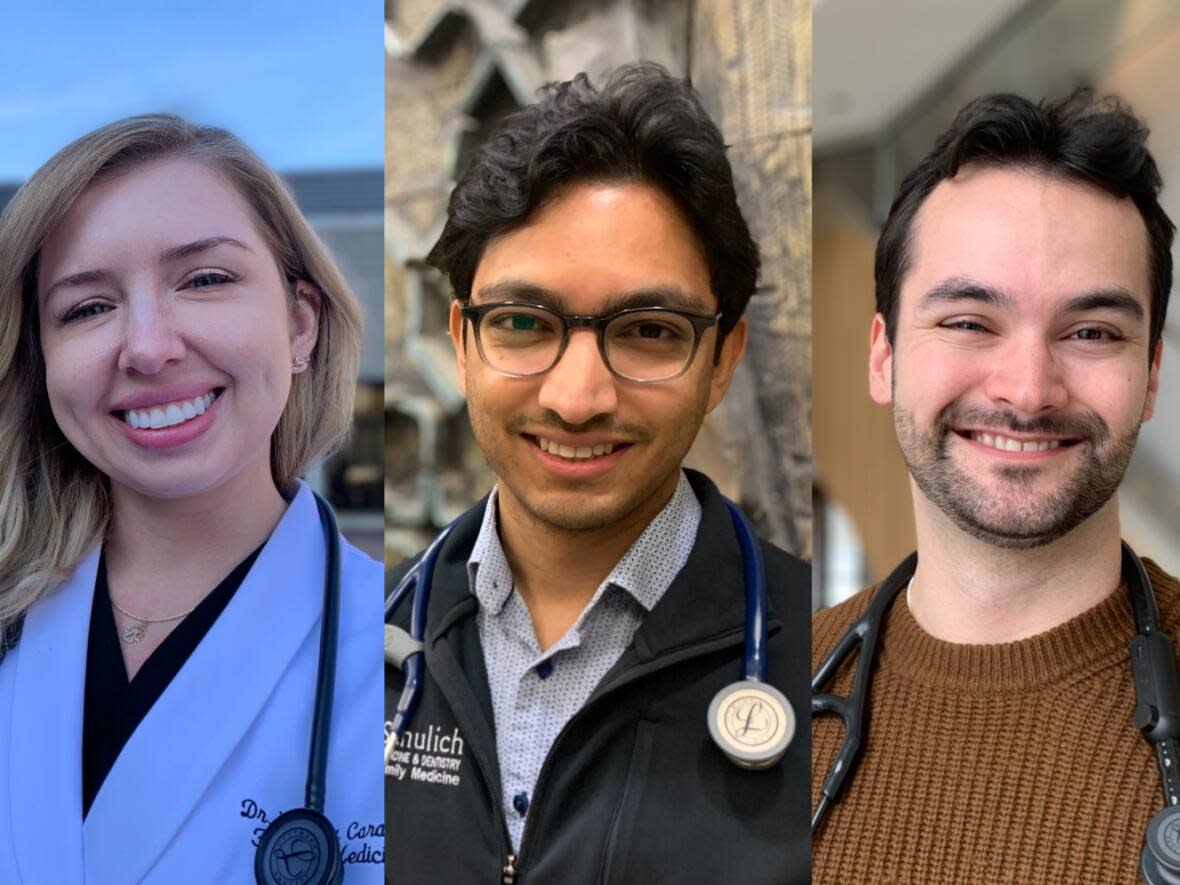Doctor shortage? Meet 3 young people who want to practice family medicine in Ontario

Some of the things that turn people off about family medicine are exactly the aspects of the specialty that excite Montana Hackett.
"You get to see people from all backgrounds, from the moment they're born all the way through every part of their life, and you get to create those longitudinal relationships with them," said Hackett, a fourth-year med student at the Schulich School of Medicine and Dentistry at Western University.
"The thing about family medicine is that the clinical breadth that you get to practice, it's huge. It's humongous, for better or worse. That breadth is a good thing but it can also be very challenging."
Ontario is in the eye of the perfect storm when it comes to a crisis in family medicine: patients need more care because they've been through a pandemic and are only now seeking help for longstanding health concerns; a recent study found that two million people don't have a family doctor. Another two million have one who is 65-years-old or older, so on the brink of retirement, according to the Ontario College of Family Physicians.
Add to that, as the need for family docs increases, the number of med students choosing family medicine as their first choice of specialty is down over previous year, according to data from the Canadian Resident Matching Service , a not-for-profit organization that matches students with medical training.
"We're seeing too few family physicians being called upon to do too many things with not enough resources. It's not sustainable," Hackett told CBC News. "Over the course of the last 30 years, we've seen conditions for primary care get worse and worse. It's no secret or surprise that family doctors are leaving the profession."
But Hackett, who grew up in London and said he had a great relationship with his own family doctor, said he's hopeful that conditions will be improving by the time he is a full-fledged physician.
Burnout and paperwork
"When I was going through my clinical rotations and told a physician that I was going to be a family doctor, they were both excited and terrified for me. Excited, because they know how great family medicine was, but they know from experience or from seeing others just how burned out people are, and that's a terrifying thing."
Family doctors are essentially small business owners, said Dr. Neil Sengupta, a second-year resident at Schulich. Family docs who work in clinics spend much as 40 per cent of their family on overhead costs like rent and utilities, he said.
Studies suggest family doctors spend an average of 11 hours a week just doing paperwork, instead of seeing patients, and a claw-back in virtual care cash from the province means an option that worked for many patients and doctors during the pandemic has been taken away.
But there's a push in med schools to remind young doctors to take care of themselves and not to work themselves into burnout including an increased focus on working with other health professionals, such as occupational therapists and nurse practitioners.
"I think all medicine comes with an occupational risk of burnout, because it's part of what we do, it's part of being a compassionate worker and caring for people. Family medicine has its own challenges but there has been attention given to the problem and the COVID pandemic has heightened that attention," said Sengupta, who is working in a London clinic.
"Ontario recently allowed more family doctors to join family health teams, and that's an amazing style of practice that allows for support systems for us to be able to practice medicine, but also it takes a huge burden off of just one sole provider," Sengupta said. "I think the biggest thing for me is the team support. Working with a family health team or having allied health professionals takes away some of the burden of care."
There's an opportunity to talk in Ontario about more private delivery of care, but the biggest issue will be making sure there are enough health professionals to work in every aspect of care, Sengupta said. "With private delivery, maybe it can help with shorter wait times, or accessing a doctor in a clinic that's closer to home or easier to access, but where are we going to get the health human resources from?"
Ultimately, having more people with family doctors or access to other primary care providers such as nurse practitioners, takes pressure off the health care system down the line, said Dr. Laura Caracas, another Schulich student training to be a family doctor who is passionate about preventative medicine.
"I believe that early intervention can change the trajectory of a person's health," Caracas said. "As a family physician, you have the opportunity to see patients multiple times and you actually have the time and space to explore with your patient and to work toward better health."
Caracas got a medical degree and worked in internal medicine in Romania, but came to Canada three years ago and is now in her second year of residency. Seeing how the two different health systems run has given her an appreciation for Canada's focus on primary care, she said.
"In Romania, primary care is not well represented so there are a lot of missed opportunities to provide preventative medicine and that leads to patients that become more sick or leads to more frequent hospitalizations," Caracas said. "I find that in Canada, because we have quite a few family physicians that are delivering primary and preventative care, things are actually better."
All three students CBC News spoke to say they know that family medicine has its challenges, but that the variety of care that they can provide to patients is enticing.
"It's a very flexible specialty, and it allows you to create a work-life balance, to tailor your practice depending on your personal and professional goals," Caracas said.

